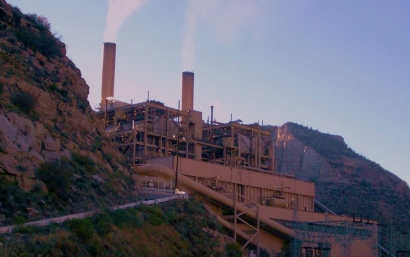
The statement was organized by the Climate Leadership Council, a group supporting a federal carbon tax led by two former Republican secretaries of state, James Baker III and George Shultz.
There are more than 40 signatories to the statement including the top economic advisers to Presidents Gerald Ford, Ronald Reagan, George H.W. Bush, Bill Clinton, George W. Bush, and Barack Obama.
Four former chairs of the Federal Reserve also signed on, including Alan Greenspan and Ben Bernanke, first appointed by Republicans, and Paul Volcker and Janet Yellen, who were first appointed by Democrats.
The signers contend a carbon tax offers the most cost-effective lever to reduce carbon emissions "at the scale and speed that is necessary."
"A carbon tax will send a powerful price signal that harnesses the invisible hand of the marketplace to steer economic actors towards a low-carbon future,” they said.
The carbon tax endorsed by the group of economists and former government officials would increase every year until emissions reductions goals are met.
The carbon-tax-and-dividend model sought by Climate Leadership Council and endorsed by the signatories in the op-ed is premised on distributing all of the revenue from the tax as a rebate to households, protecting them from higher energy costs associated with the tax.
In their statement the economists said "global climate change is a serious problem calling for immediate national action."
They went on to say they are united in the following policy recommendations:
Despite the renown and connections of the op-ed signatories, the proposal is expected to confront considerable head winds in Washington, D.C.
President Donald Trump and many Republicans continue to either ignore or dismiss climate change and voluminous scientific studies identifying it as a society-changing concern.
At the same time, the newly empowered Democrats in the House of Representatives are more enthused with another proposal, the so-called "Green New Deal" proposed by newly elected Rep. Alexandria Ocasio-Cortez, of New York.
But that plan, while much discussed, is still largely undefined. The gist of it, as distilled in various interviews that Ocasio-Cortez has given over the past several months, is that it will include massive investments in renewable energy jobs and infrastructure. The congresswoman says this will help to both dramatically decrease carbon emissions and provide economic opportunities and economic justice to more Americans.
Photo caption: Coal-fired power plants provide about 32 percent of consumed electricity in the United States, As of September 2017. This is the Castle Gate Plant near Helper, Utah. (Photo via Wikipedia Commons)
For additional information:

